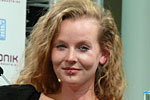World Chess Championship in Bonn
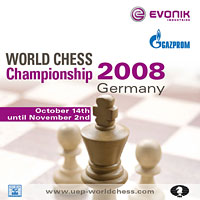
The World Chess Championship is taking place from October 14 – November 02, 2008 in the Art and Exhibition Hall of the Federal Republic of Germany in Bonn. The match consists of twelve games, played under classical time controls: 120 minutes for the first 40 moves, 60 minutes for the next 20 moves and then 15 minutes for the rest of the game plus an additional 30 seconds per move starting from move 61. The prize fund is 1.5 million Euro (approximately 2.35 million US Dollars) including taxes and FIDE license fees, and is split equally between the players.
The games are being broadcast live by FoidosChess, with video and commentary for €10 per game; and on Playchess.com. Details are given at the end of this report. Games start at 15:00h CEST (=17:00h Moscow, 9 a.m. New York).
Game six: Pein on Bonn
Anand,V (2783) - Kramnik,V (2772) [E34]
WCh Bonn GER (6), 21.10.2008 [Commentary by IM Malcolm Pein]
1.d4 Nf6 2.c4 e6 3.Nc3 Bb4 4.Qc2. Anand played the sharp 4.f3 in game two. This is a much more positional move. White avoids damage to his pawn structure if Black plays Bxc3+. and plays for the small advantage of the two bishops. 4...d5 5.cxd5 Qxd5. The most solid response developed by Oleg Romanishin. Black seeks a queen exchange via Qf5 or Qe4. 5...exd5 6.Bg5 c5 is the sharpest way to play and had led to many quick Black wins. Sokolov-Aronian Turin Ol 2006 and recently Ushenina-Kosteniuk WWCC 208 come to mind. 6.Nf3 Qf5 7.Qb3. But Anand wants to keep it complex. 7...Nc6 8.Bd2 0-0 9.h3
New! Previously 9.e3 was standard. This gives Vlad a lot to worry about. The g4 thrust might be a prelude to an attack or it might leave the queen short of squares. 9...b6 10.g4 Qa5 11.Rc1 Bb7 12.a3 Bxc3 13.Bxc3 Qd5 14.Qxd5. Anatoly Karpov was in the VIP Room and now rejected exd5 as the bishop on b7 is locked in. 14...Nxd5 15.Bd2. White has two bishops and c-file, so he is slightly better but queenless middlegames are Kramnik territory aren't they? 15...Nf6 16.Rg1. Nxd4 was a threat and e2-e4 is prevented for the moment. Karpov liked 16.g5 Ne4 17.Bf4 +/=. 16...Rac8 17.Bg2 Ne7 18.Bb4. Preventing c5, or so it seems. It was at this point I realised belatedly that the rook on g1 was coming out via g3 after bishops are exchanged which means the white king is also very well placed.
18...c5?! This does not work out. Karpov frowned. One possible line was 18...Rfe8 19.Bxe7 Rxe7 20.Ne5 Bxg2 21.Rxg2 c5 22.dxc5 Rxc5 23.Rxc5 bxc5 24.Rg3 +=. 19.dxc5 Rfd8 20.Ne5 Bxg2 21.Rxg2
21...bxc5. Staying a pawn down. Kramnik said he thought the ending was equal at first but then realised he had some problems. However the cure is worse than the disease as he never recovers the pawn, he must have missed a tactical point 21...Nc6 22.Nd3! and White must avoid 22...Nd4 23.cxb6?? Rxc1+ 24.Nxc1 Nc2+ 25.Kf1 Rd1+; but 21...Nc6 22.Nd3! Nd4 23.e3! Nb3 24.Rc3+/-; 21...a5 22.Bd2 Ne4 23.cxb6 Rxd2 24.Rxc8+ Nxc8 25.b7 Rc2! 26.Kd1! wins. 22.Rxc5 Ne4. It's just a solid pawn up for White. 23.Rxc8 Rxc8 24.Nd3
24...Nd5 25.Bd2 Rc2 26.Bc1 f5 27.Kd1 Rc8 28.f3 Nd6 29.Ke1. Karpov advocated Rg1 as a better way to avoid any knight forks but this is also good. Vishy takes it nice and slowly. 29...a5 30.e3 e5. With Kd1 and Rc2 coming Kramnik seeks activity but with less time on the clock to calculate this also backfires. 31.gxf5 e4 32.fxe4 Nxe4 33.Bd2 a4. 33...Rc2 34.Kd1?? Nxe3+; but 33...Rc2 34.Re2 Nxd2 35.Kd1 Nxe3+ 36.Rxe3 Nc4 37.Kxc2 Nxe3+ 38.Kb3 Nxf5 39.Ka4 is easy; 33...Re8 was better. 34.Nf2! The computer assessment jumped as Anand stays two pawns up.
34...Nd6 35.Rg4 Nc4 36.e4 Nf6 37.Rg3 Nxb2 38.e5! [38.Bc3 Nh5]
38...Nd5 39.f6 Kf7 40.Ne4 Nc4 41.fxg7. An echo of game 3 where Anand also missed a quicker win. 41.Rxg7+ Ke6 42.Ng5+ Kxe5 43.f7 Nxd2 44.Rg8+-. 41...Kg8 42.Rd3. There was a diabolical line: 42.Nf6+ Nxf6 43.exf6 Re8+ 44.Kd1 Rd8 45.Kc1 Nxd2 46.f7+ Kxf7 47.g8Q+ Rxg8 48.Rxg8 Nb3+! Spotted by David Norwood. 42...Ndb6 43.Bh6 Nxe5 44.Nf6+ Kf7 45.Rc3. A crowd pleaser. 45...Rxc3 46.g8Q+ Kxf6 47.Bg7+
Kramnik resigned. 1-0. [Click to replay]
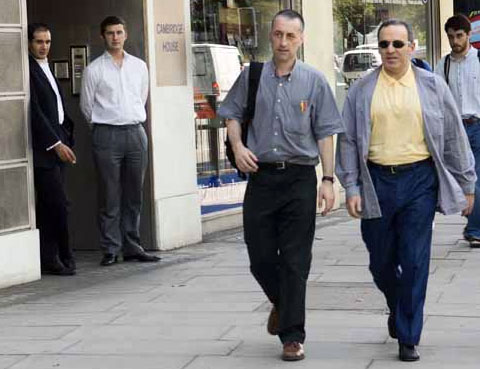
Malcolm Pein writes six days a week for the Daily Telegraph. On his day of rest he writes for the Sunday Telegraph. He runs ChessBase USA and the London Chess Center. Occasionally moonlights as a security guard to the 2800+ set.
Vera and Vaile
Pictorial report by Frederic Friedel
The World Championship in Bonn is fascinating, not just the games but also the people you meet. Every round brings new people and personalities. One charming encounter was with two remarkable young ladies, both in their mid twenties, both highly talented. We met them before the start of round five, in the cafeteria of the national art museum.
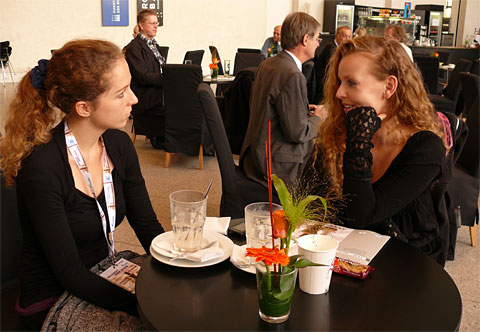
This is Vera Spillner, quantum physicist, polyglot and violinist; and Vaile, actress, soap opera star, singer, composer and adventure rider. The two met for the first time at the World Championship in Bonn.
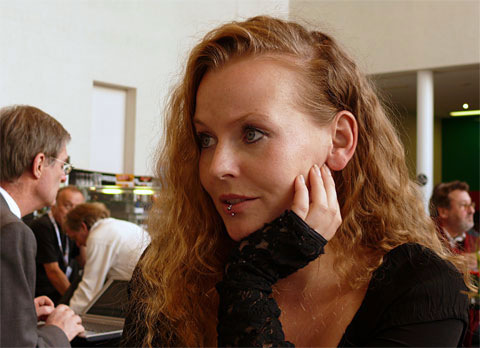
Vaile has been helping us present our music composing program Ludwig, and is providing invaluable input for its development, since she is an active composer who writes and arranges her own songs.
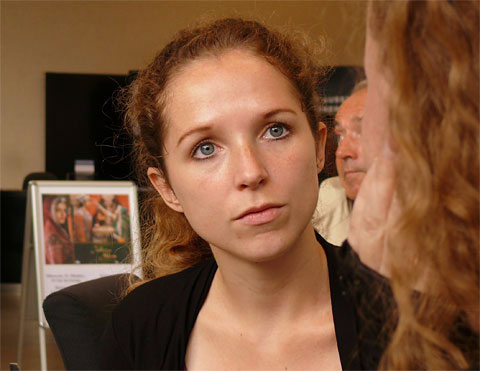
Vera Spillner is doing a PhD at the Institut für Philosophie in Bonn and studying quantum physics (special area of expertise: string theory) at the Institute for Theoretical Physics in Heidelberg. We will be writing more about Vera and the Large Hadron Collider in Switzerland, about which a number of world-class chess players have quizzed her.
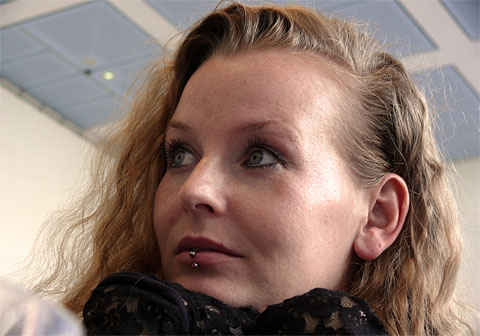
Vaile (pronounced like the thing you wear in front of your face) has an English language web site which we invite you to visit. She has produced a number of CDs with her own music, and is looking for major companies to release them in style. Vaile may look like a starlet, but don't be deceived: this is a highly intelligent professional who has studied acting in New York, plays the piano, knows music and literature, and is generally a warm, affectionate personality whom everyone immediately takes a liking to. Last December we reported on her encounter with Irish novelist and screenwriter Ronan Bennett.
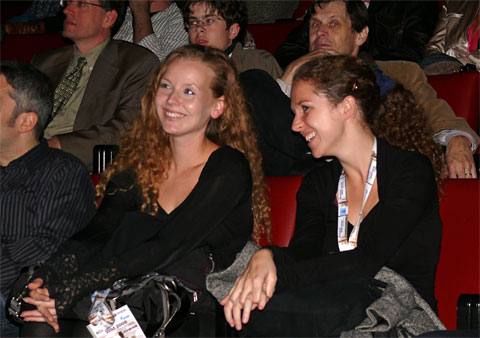
Vaile and Vera are both chess lovers and can sit in the auditorium for hours, watching the moves of Kramnik vs Anand. Vaile learnt chess on a ship during an undersea expedition (yes, she is also an expert diver), while Vera is a fairly strong amateur who enjoys replaying and analysing the games of top players. She assisted in the production of one of our Kasparov DVDs.
Which reminds us: do you know the Kasparov DVDs, which are best-sellers in our ChessBase Shop?
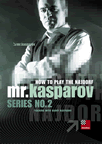
Garry Kasparov: How to Play the Najdorf Vol. 1
The World Champion for many years presents nine video lectures dealing with typical ideas and variations, concen-trating on the Poisoned Pawn Variation (6.Bg5 e6 7.f4 Qb6). Total running time: approx. 2.5 hours. |
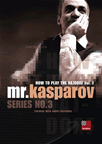
Garry Kasparov: How to Play the Najdorf Vol. 2
In 23 lectures on video, he presents the alternative lines which might arise 6.Bg5 e6 7.f4 (7…Be7, 7…Nbd7, 7…Qc7, or 7…b5). Total running time: approx. 2.5 hours. |
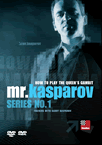
Garry Kasparov: How to Play the Queen's Gambit
Kasparov has played the Queen’s Gambit both with the white and black pieces, explo-ring its deepest subtleties. With great verve he speaks about variations and ideas of the Classical Queen’s Gambit. More than three hours of first-class private tuition. |
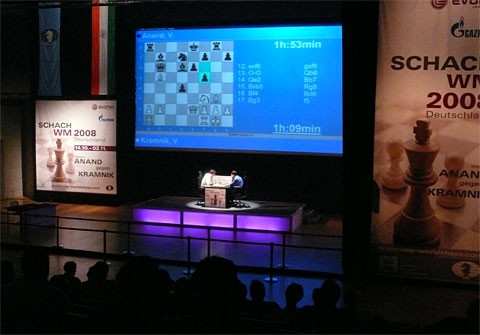
Game five in Bonn: while the players are on the stage, there is a big commentary room in which German grandmasters discuss the moves with the audience.
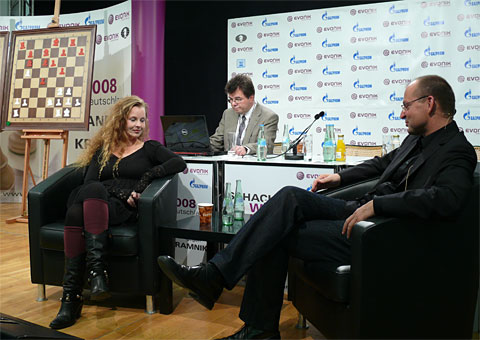
During the commentary there are often celebrity guests, and during game five it was Vaile, who is being interviewed by Professor Christian Hesse, right, while GM Klaus Bischoff takes a break from explaining the game.
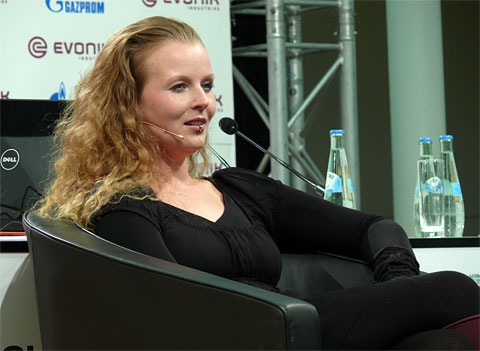
Vaile told the audience how she found and grew to love chess; but also gave people a rare and very frank insight into the productions of movies and soap series. The latter are far more intense and fast-paced, while movies are done with greater care and preparation.

The host of this chat was Professor Christian Hesse, mathematician at the University of Stuttgart, who is known to our readers for his articles on logical chess puzzles, blindfold chess, and a series on the Fischer-Spassky match in 1972. He has a keen sense of the unusual and has written an interesting book on chess puzzles and positions (unfortunately only available in German).
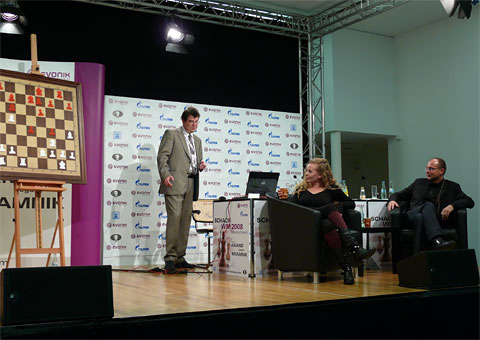
During the interview the grandmaster would occasionally interrupt when thing were happening in the Kramnik-Anand game.
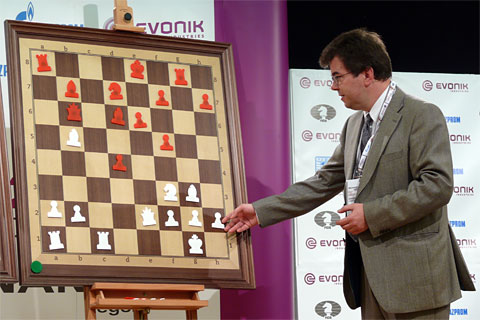
Klaus Bischoff had become an excellent host and commentator at such events. He inserts a fair amount of humor in his explanations, which are easily accessible to a lay audience. He also connects very well with the two protagonists and the audience during the press conferences after the games.
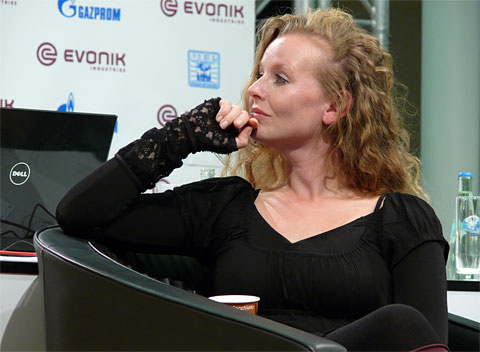
Vaile of course follows the grandmaster comments with keen interest.
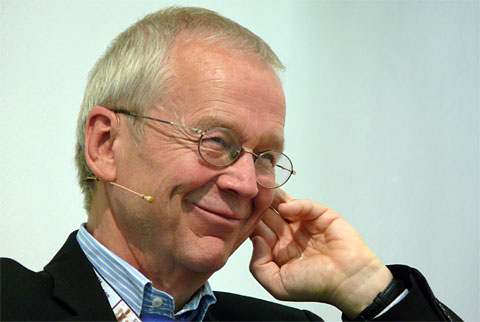
Another commentator in Bonn is our old friend Dr Helmut Pfleger, who at one time was one of Germany's most talented grandmasters, who scored 12.5/15 at the 1964 Chess Olympiad in Tel Aviv-Jaffa and helped the amateur German team win a bronze medal. Helmut later went on to become our best-recognised chess host in television series and reports. He is also a medical doctor, specialising in psychotherapy, a polyglot who speaks half a dozen languages fluently and, at 60+, an avid soccer player.

Ahhh, he caught us using our super zoom lens to get a closeup of him on the stage. Incidentally Helmut did some excellent background commentary on Anand and Kramnik for our commemorative Fritz 11 WM Edition, but unfortunately only in German.
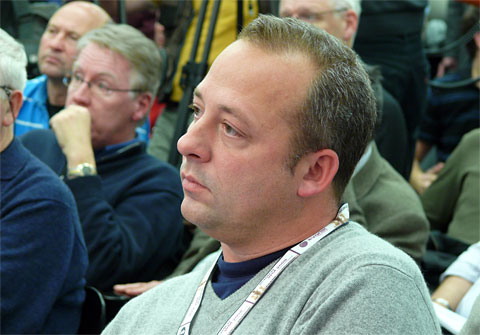
In the audience: David Robert Norwood, an English chess grandmaster, chess writer, and very successful businessman. David is reputed to be worth £10,000,000, making him one of the wealthiest Grandmasters in the world. Mind you, he has taken quite a beating in the latest global financial crisis, so that we felt like slipping him a tenner and saying "go get yourself a square meal." David has promised to help find a suitable producer for Vaile's music.
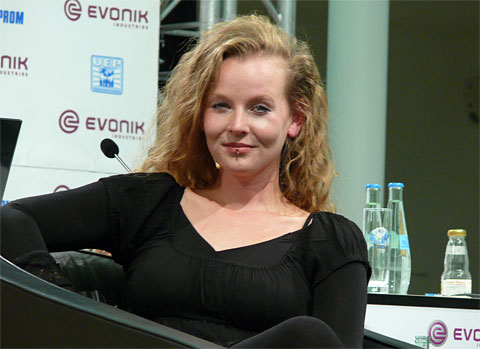
Right, David, we'll see if you actually deliver...
All photos by Frederic Friedel in Bonn
Live broadcast
The games are being broadcast live by FoidosChess, which provides five parallel video streams to present the players and commentary by grandmasters in German, English, Spanish and Russian. The cost is €10 per game. The games are also being broadcast live on Playchess.com (without videos and commentary, but also without time delay).
